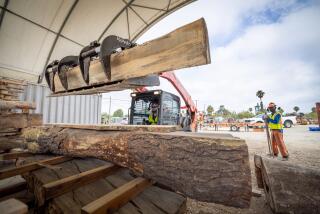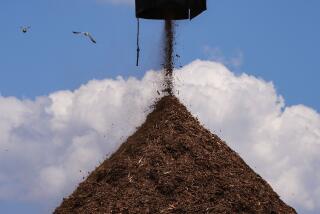American companies engaging in trade of illegal hardwoods from Peru, report charges
- Share via
More than 20 American companies have played roles in fostering a steady flow of illegal hardwoods from the Peruvian Amazon, part of a “well-oiled machine that is ransacking Peru’s forests and undermining the livelihoods and rights of the people that depend on them,” according to a new report by the Environmental Investigation Agency, a watchdog group.
The United States and Puerto Rico account for 80% of the total value of Peruvian timber sales, said Andrea Johnson, forest campaign director of the Environmental Investigation Agency.
Rampant corruption on all levels of government and the involvement of organized criminal groups in logging have built a system that assures that nearly all the timber harvested in and exported from Peru is illegal.
The report, “The Laundering Machine: How Fraud and Corruption in Peru’s Concession System are Destroying the Future of its Forests,” follows a World Bank study issued in late March detailing the vast reach and considerable economic and environmental cost of illegal logging. The World Bank says illegal logging is now a “global epidemic” and the equivalent of a football field of forest is clear cut every two seconds around the world.
The World Bank estimated that 90% of the timber harvested worldwide is illegal and accounts for about $10 billion to $15 billion in revenue, largely to organized crime groups and corrupt government officials.
The EIA, with main offices in London and Washington D.C., focuses on forestry, threatened species and global climate issues. The report released Tuesday covers the period from 2008 to 2010 and relies on documents obtained through Peru’s version of a freedom of information law, industry insiders, WikiLeaks cables from the U.S. Embassy and visits to the field.
About 70% of Peru is covered by biologically diverse forests, and it has some of the greatest acreage of tropical forest, after Brazil, Indonesia and the Democratic Republic of Congo.
Researchers focused on cedar and mahogany, which are protected under the Convention on International Trade in Endangered Species of Flora and Fauna, known as CITES, and for which special documentation is needed for logging. They found 305 shipments of CITES wood from Peru to the US, most of it cedar.
Analysis of the shipments showed that at least 112 shipments, or 35%, were of illegally logged wood. The authors cautioned this report did not track all species of protected timber.
The company that has “by far the greatest number of shipments of wood of questionable origin” is Grupo Bozovich, which has a U.S. arm, the report says. The company’s Maderera Bozovich is Peru’s largest wood products company, and U.S. affiliate, Bozovich Timber Products (BTP), is the United States’ biggest importer of Peruvian wood, mostly cedar and some mahogany.
Bozovich has certificates from the Forest Stewardship Council attesting to the sustainability of some of the wood it sells. But the company has faced legal challenges from Peruvian and American groups about the legality of its products.
The EIA analysis found that 56 of the 112 illegal shipments went to Bozovich’s U.S. affiliate. A staff member at BTP in Evergreen, AL declined to make officials available for comment.
One shipment went to Lane Stanton Vance Lumber in El Cajon and now owned by the Canadian company, McKillican.
Gary McKillican, founder and chief executive of McKillican, declined to comment on the substance of the allegations, saying the shipment Lane Stanton Vance allegedly got from Peru occurred before McKillican acquired the company in late 2010.
Johnson of EIA said her group planned to submit the report and all its data to the Justice department and trade officials. EIA said all of the companies named in the report were sent letters with its findings before the report was issued.
American companies must use wood whose origins comply with the Lacey Act. First passed in 1900 to curtail contraband trade in wildlife, the act was amended in 2008, with broad bipartisan and Bush administration support, to ban illegally logged wood products. The act defines illegal logging as activity that breaks American law or the laws of the country where the wood is grown.
Many in the domestic forest products industry supported the act because studies showed that illegally harvested wood from developing countries was cheaper, undercutting American companies.
Environmentalists pushed for the act to stave off deforestation abroad. Since its passage, studies have shown a reduction in illegal logging worldwide.
Central to the Lacey Act is the notion of “due care,” which means that companies should know, based on a country’s logging history, that its products might be at greater risk of being harvested illegally. Products from a country like Peru, for instance, should set off alarm bells for just about any importer, the report says.
The report details a system made up of layers of complicit officials and forged documents that loggers use to ship wood out of the country. The logging occurs in some of Peru’s poorest regions, and exploitation of local labor is rife, according to the report. Loggers often go months without pay, trapped in camps deep in the forests, in conditions of forced labor. The injured go largely untreated. Women cooks at logging camps are subject to sexual assault.
In a 2006 cable acquired by WikiLeaks and published in the EIA report, the U.S. Ambassador to Peru noted that “narcotraffickers … appear to be getting involved in transport of illegal timber.”
The government could curtail illegal logging simply by enforcing laws on the books and sharing information between agencies, said EIA’s Peru director Julia Urrunaga.
Johnson said companies in consumer nations like the U.S. have to go beyond making sure the paperwork is in order, as Peru has proved that documents can be forged, bought and sold.
“The private sector needs to take responsibility and acknowledge that documents are not a guarantee of legality,” she said. “They need to ask harder questions of suppliers.”







